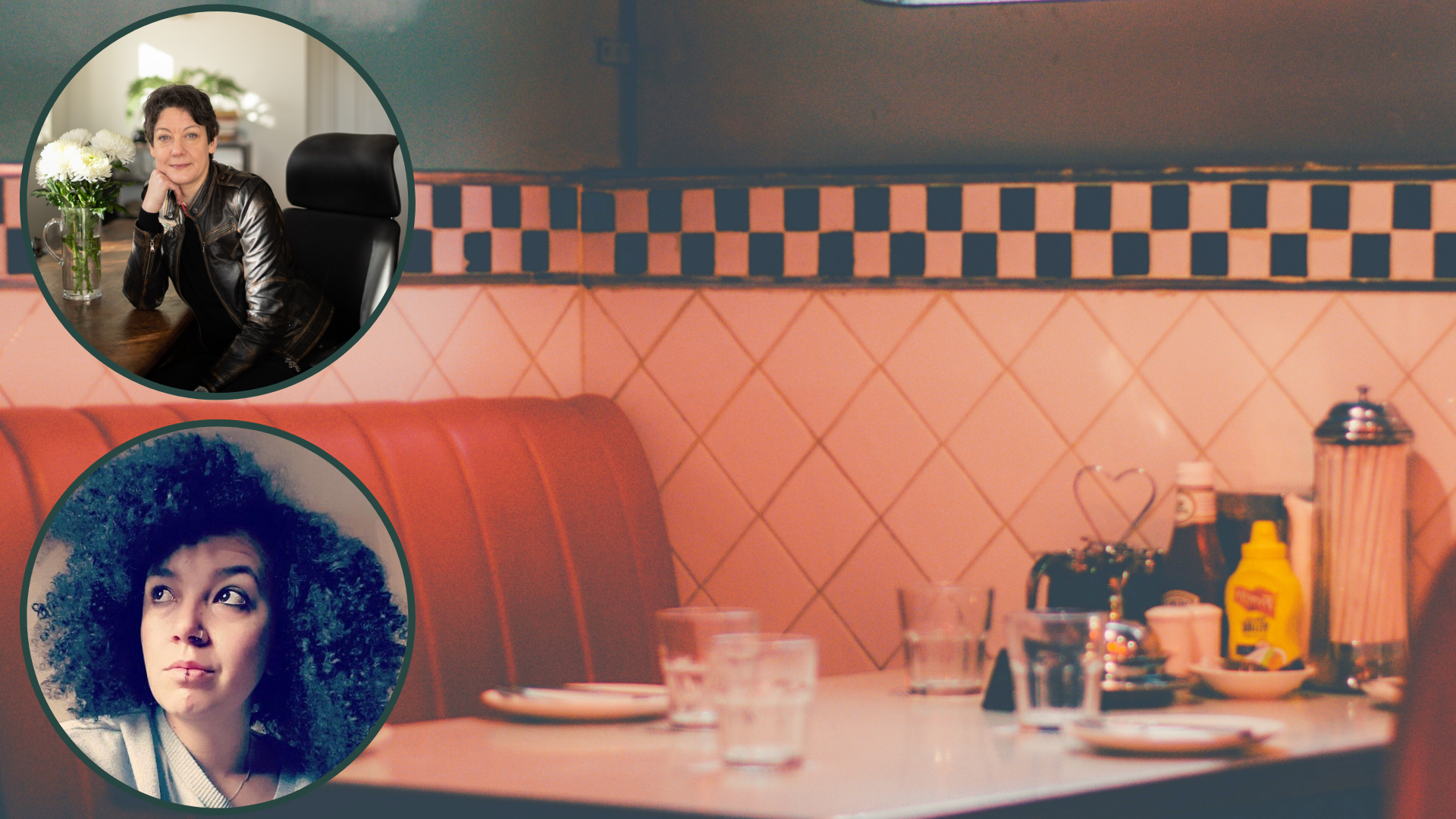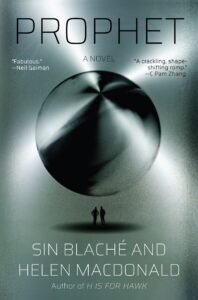
Helen Macdonald is a writer, poet, and naturalist. They are the author of the bestselling H Is for Hawk and Vesper Flights along with Shaler’s Fish, a history of falconry, and two other books of poetry. They've written and presented award-winning TV documentaries for PBS and the BBC.
Sin Blaché is an author and musician. They have been writing horror and sci-fi stories all their life. Born in California, they live in the North West of Ireland and can be found obsessing over obscure folk instruments, being an ambivalent savior to feral cats, and playing too many video games.
Helen and Sin share more about their upcoming novel Prophet, the lockdown conversations that informed the book, and taking on the concept of weaponized nostalgia while writing a love letter to genre fiction.
 Prophet follows partners Adam Rubenstein, American Intelligence officer, and Sunil Rao, ex-MI6 agent, as they investigate an ever-shifting, otherworldly substance called Prophet that is weaponizing people’s fondest memories against them. What sparked the idea for this book?
Prophet follows partners Adam Rubenstein, American Intelligence officer, and Sunil Rao, ex-MI6 agent, as they investigate an ever-shifting, otherworldly substance called Prophet that is weaponizing people’s fondest memories against them. What sparked the idea for this book?
H: During lockdown, Sin and I were talking a lot about politics, media, and the fiction, art, film and tv we loved. Nostalgia and its uses was a big part of those conversations. When we were first toying with the idea of writing together, Sin was playing Control, a video game that’s built from the emotional power we accord consumer objects. We talked about it, and talked some more. And then one night I dreamed of a secret military program to weaponise nostalgia. There were vials full of a silvery liquid in nuclear bunkers. From that, we built Prophet together.
S: I think from there, as we continued to talk about Prophet and how we imagined it worked and what we wanted the story to look like, the more we realized how relevant the concept of weaponized nostalgia is right now. We’re surrounded by reboots and remasters and reunions, despite everyone crying out and clutching at new ideas. This is true of our media and consumerism, but also it’s true of the current political climate. It was truly wonderful to be able to have so much fun writing with Helen, while also lamenting about what was going on around us during our lockdowns.
As it examines the weaponization of nostalgia and the menace of corporate greed and government corruption, Prophet fuses together many genres—sci-fi, mystery, thriller, and a slow burn romance. What was the most challenging part of writing this story? The most rewarding?
H: It was challenging to write a main character who knows instantly what’s true and what isn’t, but it was such a delightful conceit to work with in terms of breaking the frame of the mystery genre. The most rewarding thing for me was the romance between Adam and Rao; we tried to make it as real and lived as possible, while at the same time building it from the oldest and most beloved romance tropes imaginable.
S: I think that the most rewarding thing about writing this kind of character-led fiction is getting to watch the characters themselves unfold on the page before you. My worst habit while we wrote was sending Helen snippets of conversations that I’d cooked up, but the best thing to come from that was us developing their personalities further until they really did feel like real people to us. I would have to agree with Helen and say that Rao himself posed a fun challenge to write around. Rao’s talent meant that we got to play with not just sci-fi tropes, but mystery and horror and, sometimes, noir.
What was your process for working together on Prophet? What is the best part about writing as a team?
H: Sin and I hadn’t met when we started the book! We only met in person when it was very nearly finished. Prophet was written almost entirely in private messages on social media and emails. We sent each other ideas, snippets of dialogue, longer passages and chapters, then discussed, edited and reshape them until both of us were happy. Sin has a particular genius at characterisation and dialogue, and my strengths are more in evoking atmosphere and scene setting, but we both learned from each other to the point that we now find it hard to remember who originally wrote any part of the book. The best part of the collaboration? Writing is a lonely occupation, but this was not. It was absolutely exhilarating, and a proper bulwark against the despair and isolation of lockdown.
S: Writing collaboratively is a vulnerable process. Usually writers disappear for a few years and emerge, ragged, with a fresh novel between their teeth. When you’re writing with another person, you have to share all those torn edges of the story to another. Once that’s all done, we get to stand on remarkably solid ground together and that’s the real joy of it. The best part was the vulnerability, and the best part is the stability.
Was there any part of the story, as you wrote it, that surprised you?
H: I was surprised by how much I enjoyed writing horror. Never thought I’d ever dip my toes in that genre.
S: I was constantly surprised by how complex things would get. It was a joy to get to have philosophical discussions in the middle of our spy romance story. A delight to deconstruct the myths that we have about memory and self while cracking jokes, while poking at deep seated horror.
What do you hope Prophet’s readers will take away from the book?
H: I’m hoping they’ll love Rao and Adam, our terrible men, and think more about the uses nostalgia is put to— but most of all I hope they’ll share the sense of subversive joy we felt while writing it.
S: It would be great if readers could spend time in this world, with our characters, to fall in love with them as we have, and still be able to take a serious look at what kind of nostalgia is driving them. It’s a pushy little force in our lives today and there’s power in just recognizing it.
Was there anything you read, listened to, or watched while working on Prophet that influenced its creation?
H: So many things! Off the top of my head, I think of the artist-geographer Trevor Paglen’s work on secret military projects, the transformative works of fic writers of the internet, movies like Inception and Stalker, books by Philip K Dick, Jeff VanderMeer, Raymond Chandler, Michael Herr.
S: The whole book is really a love letter to genre fiction. There are so many movies, TV shows, books and video games that we talked about and watched and played while we wrote.
What are you currently reading? Are there upcoming books that you are looking forward to?
H: I’ve just started, and am immensely enjoying, Catherine Lacey’s Biography of X. I’m also reading (and re-reading) the short and exquisitely beautiful Aug 9—Fog by Kathryn Scanlan. Shy by Max Porter is just wonderful. And I’m yelling at everyone I know to read M. John Harrison’s forthcoming anti-memoir, Wish I was Here. It’s extraordinary.
S: I’m really enjoying Chain Gang All-Stars by Nana Kwame Adjei-Brenyah right now, and I’ve been looking forward to reading Elliot Page’s memoir Pageboy. I recently had the most fun reading Kid Wolf and Kraken Boy by Sam J Miller, who created a full fantasy world anchored in real history that I never wanted to leave.


